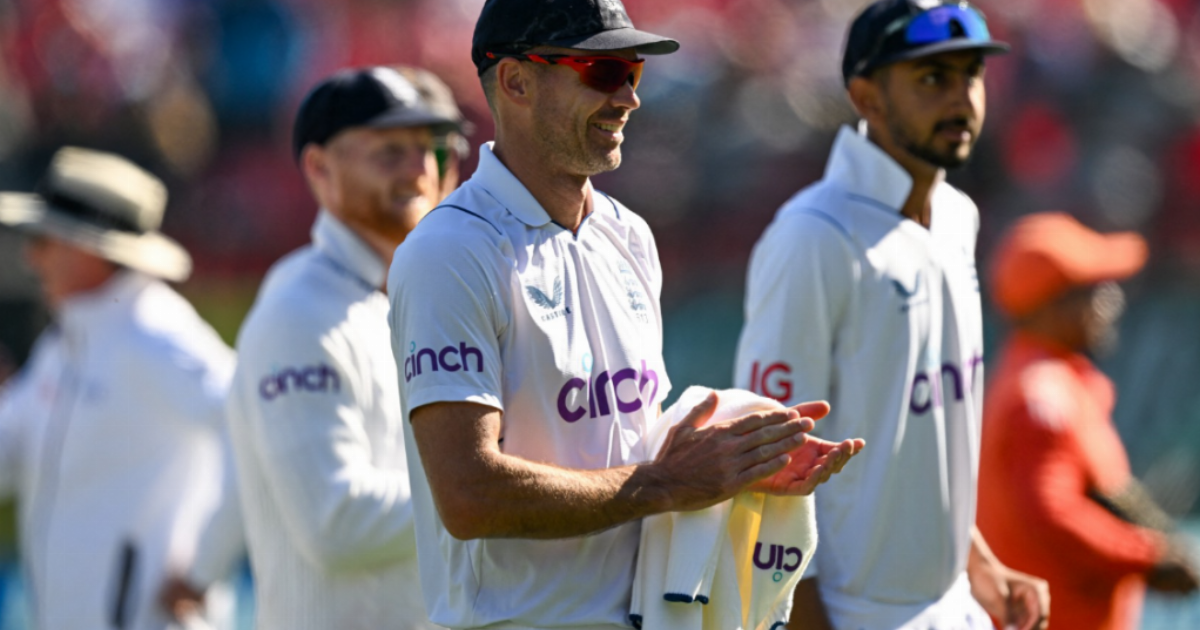‘There’s only one Jimmy Anderson,’ sung England’s supporters last week, after their man took his 700th Test wicket high in the Himalayan foothills. And it is true.
Never again will there be another pace bowler able to boast that many scalps or play that many Tests (187).
Anderson is a freak of nature, not in what he does – though bowling with that amount of control and skill is mighty impressive – but in his constant hunger for more… more wickets, more overs, more training and more months spent in dressing rooms full of competing egos and smelly socks.
You cannot but marvel at the sheer industry of it. For all the thousands of overs which he has bowled across every format of the game, there will have been a commensurate number bowled in practice.
To do all that for 22 years requires dedication (to diet and training) and sacrifice (to family life), as well as a sheer bloody mindedness bordering on the selfish.
It has helped that he possesses a wiry, athletic frame and great co-ordination. Some pace bowlers are big, muscly types who pound ball into pitch. Anderson is nuance personified, his bowling action a model of economy and clean lines.
He is 41, though, and while none doubt his hunger and ability to trouble batsmen with probing line and length, when you are that old comparisons cease to become relative.
So it’s not whether Anderson is better than so-and-so, it is whether his own game has diminished from its peak and I believe it has, as he can no longer summon his outswinger at will or bowl with the same zip in spells two and three.
When Australia were indisputably the best team in the world 25 years ago, they were ruthless at spotting the almost imperceptible decline in their great players and moving them on. James Anderson is an institution within English cricket but he must not become institutionalised.
Fast finishes won’t help Bazball’s bid to save Test cricket so summer rethink could be wise
Before their final Test in Dharamsala some of the England team met the Dalai Lama, who is exiled in the pretty mountainside town. But if they were hoping for some of his famous self-discipline to counter the excesses of their philosophy, they were quickly disappointed after India despatched them inside three days.
Bazball has enjoyed many scintillating moments since its introduction almost two years ago but it has come to look like something of a one-trick pony after England lost the series 4-1, to record their seventh Test defeat in their last 12 matches.
Bazball’s abiding philosophy – to be aggressive and take risks to make the Test format exciting and thus elevate it above the morass of white-ball cricket – is laudable.
Yet three and four-day finishes are more likely to annoy broadcasters than save Test cricket, TV companies beginning to wonder why they pay millions for a product which persistently short-changes them on the hours promised. England lost the series without a single match going into a fifth day.
Given India’s formidable home record (this was their 17th successive series win) the scoreline was not unexpected. Yet the hosts were vulnerable being without several key players including Virat Kohli, who missed the entire series due to the birth of his second child.
In those circumstances, England should really have pushed them closer than they did.
The problem with Bazball is that it engages brawn before brain. In India, pitches tend to degrade over time which makes it imperative that you make your first innings count – something England routinely failed to do mostly due to their slapdash approach. Only once in five Tests did their first innings exceed 72 overs, which is beyond careless considering they had opening partnerships worth more than fifty in four of the five matches (the other was worth 47).
Basically, spin did for them, especially the middle order, even when the ball wasn’t turning much.
Their dressing-room plan to be ultra bold against Ravichandran Ashwin and Co, especially with sweep shots, was largely a pre-meditated disaster save for Ollie Pope’s 196 in the opening Test, a ‘miracle’ knock on a turning pitch that Pope never came close to repeating in the remainder of the series.
Perhaps his and England’s success in Ahmedabad (it was the only Test they won), persuaded them this was the way to bat irrespective of circumstance, which is a naive way to play.
India toned down the pitches after that defeat which meant the risk-reward equation for batting changed, though only Joe Root made the necessary adjustments after being shamed into it by a woeful dismissal in the third Test.
It was instructive, though, that once he settled down to play with patience and a tighter defensive technique he made his highest scores of the series.
So where does this leave Bazball and some of the players who have taken sizeable risks to prosecute it? One of its arbiters, England’s head coach Brendon McCullum, reckoned his team lost because they did not go hard enough.
‘Doubts set in,’ he said. Yet, suspending reality so doubt doesn’t exist is difficult for rational people to do, which suggests only irrational fantasists need apply.
England’s next Test series are against West Indies and Sri Lanka during the summer, two teams they should beat. Playing Bazball in England is more effective because scores of 319, 353 and even 253 (three of England’s first-innings’ totals in India) tend to be competitive on English pitches where bowlers are nearly always in the game, something they only occasionally were in India.
That said, England’s spinners Tom Hartley and Shoaib Bashir did well to share 39 wickets given their inexperience, though they were several notches of competence below India’s trio of Ashwin, Ravi Jadeja and Kuldeep Yadav.
Those three took their wickets much quicker and for far fewer runs, a fact reflected in the results. England need their two to keep bowling to improve, which won’t be easy given neither are likely to be first-choice spinner for their counties.
A rethink over some of England’s batting also needs to take place, not least because Harry Brook needs to be fitted in as a matter of urgency. The players under pressure are Jonny Bairstow and the frenetic Pope, though you imagine Pope, to whom feast and famine are not unknown, might have some credit in the bank following that incredible hundred.
Whether you give Bairstow the gloves again in place of Ben Foakes, whose silky wicketkeeping will be deemed less crucial in home conditions, or look to blood a new keeper/batsmen like Durham’s Ollie Robinson, is for McCullum, Stokes and Rob Key to decide.
Bazball has a future, but not in its current state.
MORE : India captain Rohit Sharma hits back at England star Ben Duckett over Yashasvi Jaiswal claim
MORE : Serie A side Lecce sack manager Roberto D’Aversa for headbutting opposition’s striker













